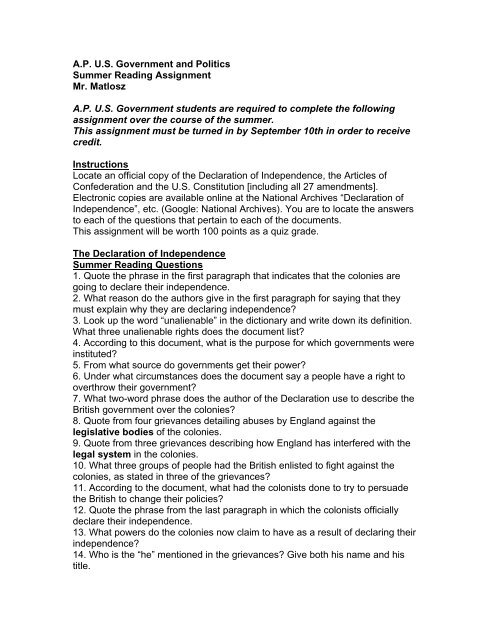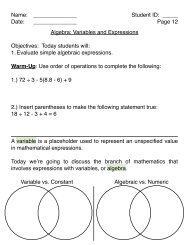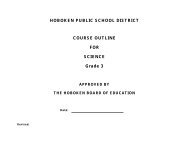AP US Government (pdf)
AP US Government (pdf)
AP US Government (pdf)
Create successful ePaper yourself
Turn your PDF publications into a flip-book with our unique Google optimized e-Paper software.
A.P. U.S. <strong>Government</strong> and Politics<br />
Summer Reading Assignment<br />
Mr. Matlosz<br />
A.P. U.S. <strong>Government</strong> students are required to complete the following<br />
assignment over the course of the summer.<br />
This assignment must be turned in by September 10th in order to receive<br />
credit.<br />
Instructions<br />
Locate an official copy of the Declaration of Independence, the Articles of<br />
Confederation and the U.S. Constitution [including all 27 amendments].<br />
Electronic copies are available online at the National Archives “Declaration of<br />
Independence”, etc. (Google: National Archives). You are to locate the answers<br />
to each of the questions that pertain to each of the documents.<br />
This assignment will be worth 100 points as a quiz grade.<br />
The Declaration of Independence<br />
Summer Reading Questions<br />
1. Quote the phrase in the first paragraph that indicates that the colonies are<br />
going to declare their independence.<br />
2. What reason do the authors give in the first paragraph for saying that they<br />
must explain why they are declaring independence?<br />
3. Look up the word “unalienable” in the dictionary and write down its definition.<br />
What three unalienable rights does the document list?<br />
4. According to this document, what is the purpose for which governments were<br />
instituted?<br />
5. From what source do governments get their power?<br />
6. Under what circumstances does the document say a people have a right to<br />
overthrow their government?<br />
7. What two-word phrase does the author of the Declaration use to describe the<br />
British government over the colonies?<br />
8. Quote from four grievances detailing abuses by England against the<br />
legislative bodies of the colonies.<br />
9. Quote from three grievances describing how England has interfered with the<br />
legal system in the colonies.<br />
10. What three groups of people had the British enlisted to fight against the<br />
colonies, as stated in three of the grievances?<br />
11. According to the document, what had the colonists done to try to persuade<br />
the British to change their policies?<br />
12. Quote the phrase from the last paragraph in which the colonists officially<br />
declare their independence.<br />
13. What powers do the colonies now claim to have as a result of declaring their<br />
independence?<br />
14. Who is the “he” mentioned in the grievances? Give both his name and his<br />
title.
15. Who wrote the Declaration of Independence?<br />
16. Which two signers of the Declaration of Independence later became<br />
presidents of the U.S.?<br />
17. What body governed the colonists from 1776 to 1781?<br />
18. Which two signers of the Declaration of Independence died on the same day<br />
and year? Provide their names, date and year.<br />
Articles of Confederation<br />
Summer Reading Questions<br />
ARTICLE I-III<br />
1. What was the name of the confederacy formed under this document?<br />
2. In your own words, explain the guarantee of Article II?<br />
3. According to Article III, what were the three purposes for which the states<br />
organized into a confederation?<br />
ARTICLE IV<br />
4. The “free inhabitants of each of thee states” were entitled to what<br />
consideration by all of the states?<br />
5. Look up the words “ingress” and “regress” in a dictionary and write down their<br />
meanings.<br />
6. What is the right of “free ingress and regress” described here?<br />
7. Look up the word “extradition” and write down its meaning. Which of the<br />
paragraphs in this article provided for extradition among the states? Give a<br />
quotation from the paragraph to support your answer.<br />
8. The third paragraph of this article says that all states must respect what<br />
actions of the other states?<br />
ARTICLE V<br />
9. Who or what body determined the method by which delegates were selected<br />
for Congress?<br />
10. Why would the states want to have the power to recall their delegates and<br />
send new ones to Congress?<br />
11. How many delegates could each state send to Congress?<br />
12. How many years could any one person serve as a delegate to Congress?<br />
13. How many votes did each state have in Congress?<br />
14. What two guarantees for members of Congress are included in the last<br />
paragraph of this article?<br />
ARTICLE VI<br />
15. Could North Carolina send an ambassador to Holland to ask for its help in the<br />
revolutionary war? Give a quotation from this article to support your answer.<br />
16. If the U.S. made a treaty with Spain saying that Spain could export goods to<br />
the U.S. without paying a tax, could Massachusetts and Pennsylvania put a tax<br />
on those goods as they entered their states? Give a quotation from this article to<br />
support your answer.
17. Could George Washington have been made a duke by Congress as a reward<br />
for his services during the revolutionary war? Give a quotation from this article to<br />
support your answer.<br />
18. Could Maryland and Virginia have formed an alliance without the consent of<br />
Congress? Give a quotation from this article to support your answer.<br />
19. States were not allowed to keep standing armies during peacetime, but what<br />
group could they use to defend themselves? Give a quotation from this article to<br />
support your answer.<br />
20. Could Georgia go to war to defend itself against a Spanish invasion without<br />
consulting Congress? Give a quotation from this article to support your answer.<br />
ARTICLE VIII<br />
21. What types of debts would the confederation pay for?<br />
22. On what basis was the amount of tax each state had to pay to the<br />
confederation to be figured?<br />
23. Who had the power to lay taxes, the confederation of the states? Give a<br />
quotation from this article to support your answer.<br />
ARTICLE IX<br />
24. In your own words, list the powers granted to the confederation in the first<br />
paragraph of this article.<br />
25. Congress was “the last resort on appeal” for what disputes mentioned in the<br />
second paragraph of this article?<br />
26. From whom did the commissioners or judges of the confederation have to<br />
take an oath before they could decide a case?<br />
27. What powers are granted to Congress in the fourth paragraph of this article?<br />
28. What powers are granted to Congress in the fifth paragraph of this article?<br />
29. According to the sixth paragraph of this article, how many states had to<br />
approve the actions of Congress before they could take effect?<br />
30. Suppose that the people of Florida wanted their colony to join the United<br />
States under the Articles of Confederation. According to Article XI, what would<br />
have to happen before Florida could be admitted as a state?<br />
31. What did the confederation pledge to do in Article XII?<br />
ARTICLE XIII<br />
32. In your own words, state the main idea of the first sentence of this article.<br />
33. What does this article say about amending the Articles of Confederation?<br />
34. According to the last paragraph, what did the signers of the Articles of<br />
Confederation guarantee by their signatures?<br />
35. The Articles of Confederation provided for only one branch of government,<br />
while the Constitution provides for three. Which two branches of our government<br />
were left out of the Articles of Confederation?<br />
36. Look up more information on the Articles of Confederation and list two of its<br />
major weaknesses.<br />
37. Why did Maryland not ratify the Articles of Confederation until much later than<br />
the other states?
38. Between the dates when the U.S. declared its independence and the date<br />
when the Articles of Confederation went into effect, what body governed the<br />
United States?<br />
The United States Constitution<br />
Summer Reading Questions<br />
Article I<br />
1. The House of Representatives and the Senate are in which branch of<br />
government?<br />
2. What are the three qualifications a person must meet to become a<br />
representative?<br />
3. According to Section 3, who elects senators? Who elects senators now?<br />
4. What are the three qualifications a person must meet to become a senator?<br />
5. Look up the word “veto” in a dictionary and write down its definition. What<br />
section of Article I discusses veto?<br />
6. List five of the powers and/or duties of Congress.<br />
ARTICLE II<br />
1. The president is in which branch of government?<br />
2. What are the three qualifications a person must meet in order to be president?<br />
3. List two executive checks over the legislative branch.<br />
4. List two executive checks over the judicial branch.<br />
5. List three of the powers and three of the duties of the president.<br />
6. How are presidential electors selected?<br />
7. Who elects the president if no candidate receives a majority in the Electoral<br />
College vote?<br />
8. Who takes over the office of president if the president dies or is otherwise<br />
removed from office?<br />
9. What body determines the order of succession to the presidency in the event<br />
that both the president and the vice-president are removed from office?<br />
ARTICLE III<br />
1. The Supreme Court is in which branch of government?<br />
2. In what types of cases does the Supreme Court have original jurisdiction?<br />
3. Who is allowed to establish courts inferior to the Supreme Court?<br />
4. What check does the second paragraph of Section 2 give Congress over the<br />
Supreme Court?<br />
5. In your own words, state the main guarantee of the last paragraph of Section<br />
2.<br />
ARTICLE IV-VII<br />
1. In your own words, explain the main idea of Article IV, Section 1.<br />
2. Look up the word “extradition” in a dictionary and write down its definition. In<br />
what article and section is extradition discussed?<br />
3. What does the first paragraph of Article IV, Section 3 forbid?<br />
4. In your own words, describe the three main statements of Article IV, Section 4.
5. In what two ways can amendments to the Constitution be proposed?<br />
6. In what two ways can amendments to the Constitution be ratified?<br />
7. What is each state guaranteed in Article V?<br />
8. In Article VI what is required of all elected officials in the United States?<br />
9. What does Article VI say can never be used as a requirement for public office<br />
in the United States?<br />
10. According to Article VII, how many states were required to ratify the<br />
Constitution for it to go into effect?<br />
THE BILLOF RIGHTS<br />
1. Look up “eminent domain” and write down its definition. Which amendment<br />
discusses eminent domain?<br />
2. A list of the ideas in the Bill of Rights appears below. Decide in which<br />
amendment each is found. For example: a. Freedom of speech can be found in<br />
Amendment…<br />
a. freedom of speech<br />
b. the states keep all powers not given to the federal government<br />
c. right to a speedy and public trial<br />
d. cruel and unusual punishments are illegal<br />
e. freedom of religion<br />
f. indictment by grand jury before trial<br />
g. right to assemble peacefully<br />
h. freedom from search and seizure except by warrant<br />
i. right to trial by jury in criminal cases<br />
j. right to bear arms<br />
k. freedom of the press<br />
l. trying someone for the same crime twice is illegal<br />
m. accused persons have the right to be informed of the charges against them<br />
n. no quartering of troops in civilian homes<br />
o. right to petition the government<br />
p. a person cannot be forced to testify against himself or herself<br />
q. a person has the right to be confronted with the witnesses against him or her<br />
in a trial<br />
r. a person can compel witnesses to appear in his or her favor<br />
s. a person cannot be deprived of life, liberty, or property without due process of<br />
law<br />
t. rights enjoyed by U.S. citizens cannot be taken away on the grounds that they<br />
do not<br />
appear in the Constitution<br />
u. the government cannot take private property for public use unless it pays the<br />
owner<br />
for the property<br />
v. right to trial by jury in civil cases<br />
w. no excessive bails or fines can be imposed
AMENDMENTS 11-27<br />
1. Look up “poll tax” and write down its definition. In what amendment does this<br />
concept appear?<br />
2. Look up “lame duck” and write down its definition. In what amendment does<br />
this concept appear?<br />
3. A list of the ideas from the amendments appears below. Using complete<br />
sentences decide in which amendment each is found. For example: a. slavery<br />
abolished can be found in Amendment? (Amendments may be used more than<br />
once).<br />
a. slavery abolished<br />
b. federal income tax started<br />
c. alcoholic beverages prohibited<br />
d. separate voting for president and vice-president in the electoral college<br />
e. presidents can only be elected for two terms<br />
f. judicial power of the U.S. does not cover suits brought by the citizens of one<br />
state against another state<br />
g. former slaves granted right to vote<br />
h. Washington D.C. granted presidential electors<br />
i. eighteen-year-olds granted the right to vote<br />
j. former slaves made citizens of the U.S.<br />
k. former slaves counted as one whole person for purposes of representation in<br />
the House of Representatives<br />
l. officers of the U.S. who rebelled against the government no longer allowed to<br />
hold office<br />
m. direct election of senators<br />
n. women granted the right to vote<br />
o. congressional sessions begin January 3 of each year<br />
p. prohibition repealed<br />
q. neither the U.S. government nor the government of any state will pay debts<br />
incurred during a rebellion against the United States<br />
r. poll taxes cannot be used to prevent people from voting in federal elections<br />
s. the vice-president becomes acting president when the president is ill<br />
t. inauguration of the president is January 20
















